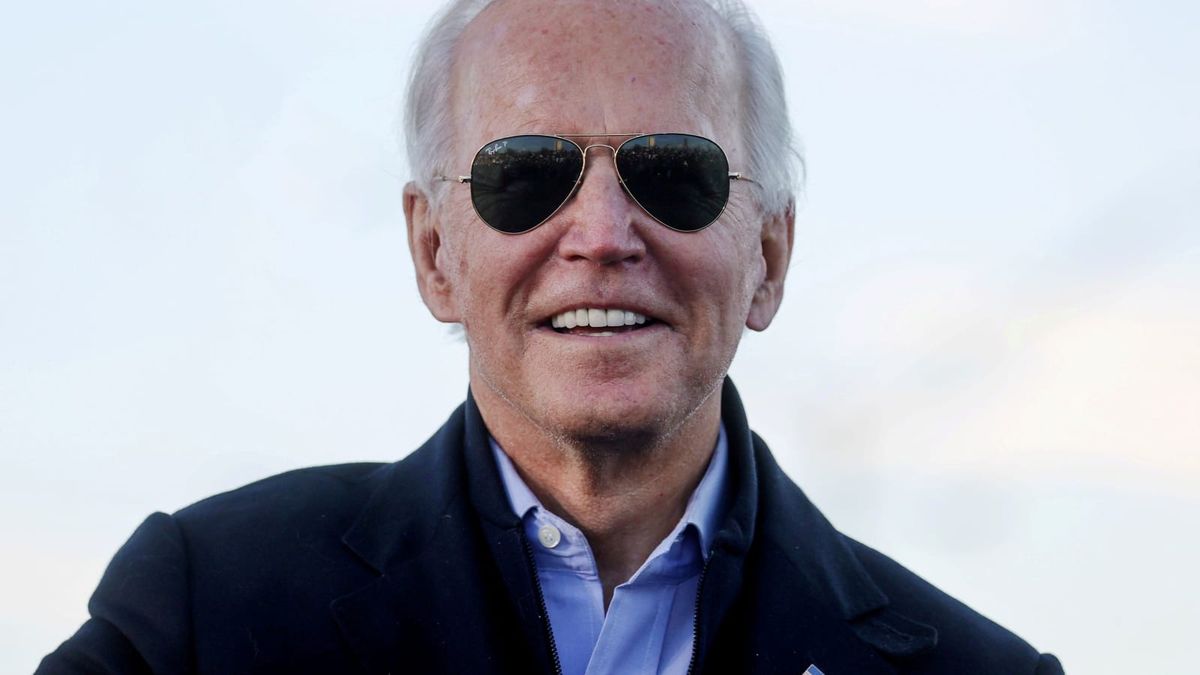Biden’s first 100 days, explained

A few minutes every morning is all you need.
Stay up to date on the world's Headlines and Human Stories. It's fun, it's factual, it's fluff-free.
While Biden’s agenda is highly ambitious, with the US Congress now in Democratic hands, much of it may just be attainable.
When President Franklin D. Roosevelt (FDR) was inaugurated in 1933, he moved with unprecedented speed to counter the effects of the Great Depression. Since then, the symbolic nature of the first 100 days of a presidency has been an indicator of both a new president’s priorities and their willingness to fulfill their campaign promises.
President Joe Biden has been put in a similar situation as FDR was nearly 90 years ago, but instead of reversing a depression, Biden will be held responsible for reversing the course of a pandemic that has resulted in massive economic, social and political turmoil.
Here is what Biden is expected to try to achieve during his first 100 days in the White House.
COVID-19 response
One of the first things Biden did during his transition was to create a COVID-19 advisory board composed of 13 health experts to advise him on how to best address the virus as president. The board includes a former commissioner at the Food and Drug Administration (FDA), a former surgeon general and an associate professor of medicine and epidemiology at Yale.
In addition to the advisory board, Biden named Dr. Anthony Fauci as lead medical adviser on COVID-19 and Dr. Marcella Nunez-Smith as the COVID-19 equity task force chair.
Biden has also announced that he plans to issue a nationwide mask mandate and has committed to rejoining the World Health Organization (WHO) on his first day in office, an organization the United States pulled out of during the summer.
The Biden administration has also pledged to push for a US$1.9 trillion stimulus bill, which would include US$1,400 direct payment checks for qualifying citizens. This would be on top of the US$600 direct payments that were included as part of the previous stimulus package, ultimately bringing the total to US$2,000, the number that Congressional Democrats have been advocating for since the beginning of negotiations.
Biden has committed to distributing 100 million vaccinations throughout the US during his first 100 days. If he and his team succeeds, it will be considered one of the largest vaccine rollouts ever to be completed in such a short amount of time.
Climate change
Climate change was a major point of Biden’s campaign and a subject that he fought to keep near the top of the agenda even during the pandemic.
Before launching any policies, Biden made clear his intention to fill his cabinet with people who prioritize climate change. Choices such as Pete Buttigieg for transportation secretary have signaled that President Biden is pushing for movement on the issue of climate change outside of traditional spheres.
Biden has committed to immediately rejoining the Paris climate accord, an agreement that former President Donald Trump pulled the US out of in November after the necessary one-year waiting period that followed his notifying the United Nations.
Biden has expressed interest in organizing a climate world summit to evaluate climate action with nations that have high carbon emissions. The prospect of such a summit has received skepticism over just how realistic it will be to carry out during a pandemic, leading to the possibility that it might not take place until late 2021, or even later.
Biden has also pushed for a US$2 trillion investment into clean energy and sustainable practices, with the goal of getting the country to net-zero emissions by 2050.
Finally, Biden has promised to rapidly reverse many of Trump’s regulatory rollbacks on environmental standards.
Economy
Biden has his work cut out for him in trying to get the economy back to where it was before the pandemic began. At its peak, the pandemic left more than 20 million Americans unemployed.
Biden has expressed his desire to create five million jobs through investments in his proposed “Made in America” plan, a move that would inject nearly US$700 billion into domestic manufacturing and development.
He has also committed to raising corporate income taxes to 28%, a significant increase after the tax cuts signed into law in 2017 by Republicans. Biden has stressed that Americans making under US$400,000 would not be taxed any more than they currently are.
Foreign policy
Biden’s return to the White House is certainly going to mark a stark change in tone from that of his predecessor, with many curious as to whether the incoming Biden administration will result in civility making a comeback.
Biden has tweeted that “We need a leader who will be ready on day one to pick up the pieces of Donald Trump’s broken foreign policy and repair the damage he has caused around the world,” implying that under his administration there would be a number of changes put in place to repair the US’ relationships with its allies.
The Middle East will certainly present Biden with similar problems as those it presented to former Presidents Trump and Obama. The Biden administration will possibly take into greater consideration human rights around the world, which might see a return to some Obama-era policies.
Among other things, the Biden administration is expected to remove immigration restrictions put into place on those coming from Muslim-majority countries, infamously known as Trump’s “Muslim ban.”
Though Biden will embrace some of the Obama administration’s policies with regard to foreign policy, it is likely Biden’s administration will blaze its own trail with regard to relations with China.
The trade war enacted under the Trump presidency has seen the US take a largely solitary approach in its dealings with China. While Biden will likely dial back the aggression Trump showed China, he is expected to make use of the leverage created by Trump in his own relations to China rather than returning to an entirely multilateral strategy, like that seen under Obama.
In any case, Biden will be expected to stand firm on issues of human rights, such as concerns over China’s treatment of its Uighur Muslim population.
Biden’s positions toward the European Union will certainly be friendlier than Trump’s, considering the US and Europe’s shared interest in combating climate change.
Rejoining the Paris climate deal will be a step toward improving relations with the economic bloc and the EU is likely the least of Biden’s concerns given the sheer number of values they share with the US.
However, there is some question as to the exact tone Biden will set toward economic policy in the EU. With American tech giants under the microscope and free trade becoming a major issue over the past five years, it’s possible that Biden will consider a slightly less aggressive version of some Trump-era tariffs.
Racial justice
After a summer that saw thousands of Black Lives Matter protests nationwide, Biden owes his election in part to those who expect him to tackle issues of racial injustice.
Biden has promised to institute a national police oversight commission in his first 100 days that would be part of a Department of Justice investigation into instances of police brutality and prosecutorial misconduct.
He has also pledged to address criminal justice reform by encouraging Congress to pass the SAFE Justice Act, a bill that would reduce the use of mandatory minimum sentencing for nonviolent offenses. These acts came in large part as a response to the national outcry over the police killing of George Floyd.
When it comes to the issue of immigration, Biden has said that he will put a halt to the construction of the wall that Trump promised along the US-Mexico border. He has also committed to reforming the US asylum system and the treatment of people at the border, including putting a stop to the migrant protection protocols put in place under Trump and ending the practice of separating immigrant families trying to enter the US.
Biden is also expected to improve relations with tribal nations by investing in the restoration of tribal lands and addressing the health disparities that became apparent during the pandemic. He has also made his intentions clear in moves like nominating New Mexico Representative Deb Haaland to be the first Native American secretary of the interior.
LGBT rights
Biden has promised to end Trump’s ban on transgender individuals serving in the military on his first day. He has also committed to a return of Obama-era guidelines for schools relating to the protection of transgender children, particularly in regards to access to bathrooms, locker rooms and sports.
Biden has also stated that he will push Congress to pass the Equality Act, which would allow for increased protections of LGBT Americans, specifically legislating that discrimination based on gender identity or sexual orientation is unlawful discrimination based on sex. The bill was passed in the House in 2019 but died in committee in the Senate.
Education
Biden has expressed support for extensive changes to the US public education system, including increased pay for teachers, though his education agenda comes largely without a timeline. He has also expressed interest in some level of student loan forgiveness, though the exact degree to which he is willing to forgive student loan debt is unclear.
Biden has been supportive of eliminating tuition at public universities for students whose families make under US$125,000 annually.
How much will really Biden really accomplish?
Until the victories of Democrats Raphael Warnock and Jon Ossoff in the Georgia runoff election, it was unclear whether or not the Senate would be controlled by Republicans or Democrats heading into the 2021 legislative year. As a result, just how much of Biden’s agenda would be able to get through Congress unimpeded was a matter of speculation.
But now, with Democrats holding a majority in the Senate thanks to Vice President Kamala Harris’ tiebreaking vote, Biden is certain to have an easier time seeing his nominees and various parts of his agenda confirmed.
However, following the siege of the Capitol by Trump supporters on January 6 and the upcoming Senate impeachment trial of former President Donald Trump, just how much time Congress will be able to devote to Biden’s agenda in the next few weeks remains speculative.
Ultimately, while Biden’s agenda is highly ambitious, with the US Congress now in Democratic hands, much of it may just be attainable.
Have a tip or story? Get in touch with our reporters at tips@themilsource.com




Comments ()